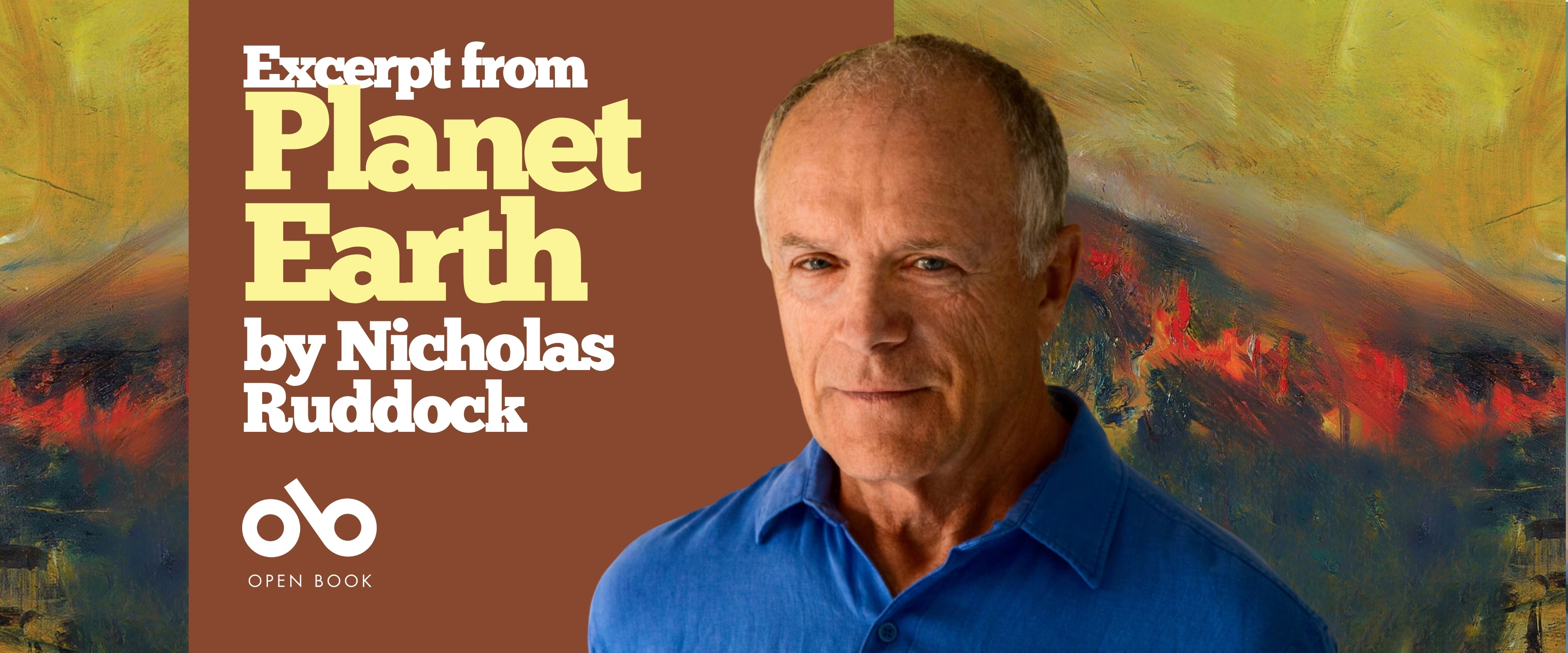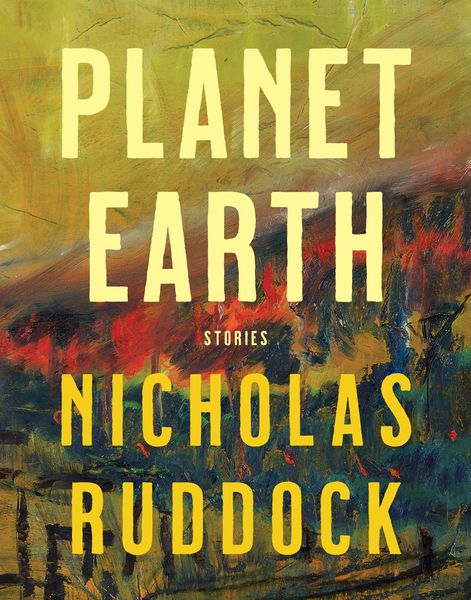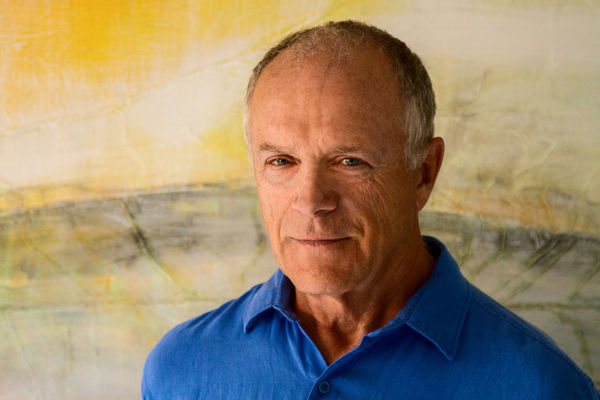Read an Excerpt from PLANET EARTH, the New Short Story Collection from Nicholas Ruddock
Today we're featuring a vibrant new short story collection that captures a wild mix of tenderness, humour, and flawed humanity, all of which stands out against the backdrop of an unsteady world. Told in a range of styles, from quick bursts of flash fiction to long, sweeping sentences, each piece in Planet Earth offers a fresh look at how people love, act, fail, and try again.
The deft prose of acclaimed author Nicholas Ruddock guides readers through poignant moments that leap across decades and continents. From a famous literary feud in Mexico that inspires a young Marxist couple’s violent act of revenge in Toronto years later, to the story of an anxious young man who finds solace in the employ of iconic musician Prince, to the Algerian protests and police violence in 1961 Paris. No matter which unexpected avenue these narratives follow, Ruddock’s storytelling is always brisk, surprising, and full of life.
Planet Earth gathers these vivid stories into a lively and compelling whole. The collection celebrates our quirks and contradictions while acknowledging the uneasy times we live in, reminding us that connection and curiosity remain powerful forces even when the world feels uncertain.
Check out this excerpt from just one of these fascinating stories right here!
An Excerpt from PLANET EARTH by Nicholas Ruddock
(From the story, SWEET BOY)
Leona called from the agency saying that an incredible opportunity had opened up, there could be no more procrastinating, and she kept repeating my name as she spoke—Timothy, Timothy—fearing my attention would slip, Mother watching me from across the kitchen, wiping the same sweep of counter five times, ten times—Leona, Leona, I echoed for reassurance—and so she continued, saying that Prince had called her, Prince the musician, his baritone voice unmistakable, asking her if she could recommend a young man to serve at his mansion in Chanhassen as a duster, someone skilled in the use of Swiffers, damp cloths, brooms, dustpans, ridiculous though it might seem particles of dust were wreaking havoc on his creative process, and Leona did not hesitate or question him, instead she asked immediately if this would be a full-time position and he said yes, permanent and full time starting at twice the minimum wage but the job was no cakewalk, the household was imposing, 65,000 square feet, at which point Leona said, crossing her fingers, that she had the perfect candidate, Timothy Adams, nineteen, on self-imposed hiatus from the University of Minnesota despite a brilliant academic record, presently conflicted by an anxiety disorder but hardworking, honest, and she could have him at Prince’s door at 7:30, just say the word, and rather than haggle Prince agreed, the arrangement was made, I was to report to Prince’s mansion at 7:30 the next morning—Leona would text the details—and she reminded me that I would be representing the agency, that before meeting Prince I should familiarize myself with the passage from Genesis for dust you are and to dust you shall return, and although she was fond of me, all fondness had limits, she said, advice that I bashfully received, thanking her, hanging up, and there was Mother still polishing the counter clockwise, counter-clockwise, vigorously, and I told her that in the morning I would begin a promising position in the suburb of Chanhassen, dusting for Prince, at which news she dropped her cloth to the floor, pushed past me to the telephone and began to dial the number for our relatives in Lansing, cost be damned, but before that connection could be made I slipped away into the pantry, put on my winter coat and a pair of canvas gloves, and out I walked to the far meadow carrying a saltlick for the deer, placing it upon a crust of frozen grass at the forest’s edge, and then I stepped back and took a series of frosty breaths in the moonlight waiting for my friends to emerge, to abrade their tongues eagerly upon the blue-tinged surface as though salt were a drug rather than a physiological necessity, but the entire herd stayed in hiding, antlers indistinguishable from a myriad of inner branches, so I trudged homeward with mixed emotions, buoyed somewhat by my upcoming opportunity with Prince but chagrined still by unfocused melancholy, and next came a drawn-out whistle from a distant train, its mournful dirge torn ragged by winter’s wind.
Next morning, my mother was a-bustle in the kitchen, bacon, eggs, buttered toast, “In the Hall of the Mountain King” blasting from the boombox, lunch in a paper bag, a kiss on the cheek, finally a friendly push into predawn Minnesota, and no doubt she watched as I walked the entire length of the driveway to the main road and disappeared behind a copse of cedar, then it was blacktop to the first stoplight where ice-fog blurred the semaphore of red-yellow-green, creating a dissociative atmosphere, I thought, but there was the proper bus, I climbed aboard and sat behind the driver and we arrived on schedule at the semirural suburb of Chanhassen, sun peeping up in the east like a yellow flare, and I was back on foot jittering my gloved hand against a chain-link fence up to an imposing gate controlled, I realized, by an electronic eye for it swung open at my shadow, its casters bumping over pellets of rock salt, and I became aware of a burly gateman saying Duster? and directing me toward a pearl-white mansion that appeared to be constructed from huge blocks of limestone, but in fact those blank walls turned out to be clad in a metallic shell of tempered steel or zinc, toward which I made my way as though at home with novel enterprise until I arrived at the threshold and an ordinary doorbell upon which I pressed, and mirabile dictu, Prince the musician himself swung open the massive door, first bowing to me respectfully then smiling, his expression entirely without the forbidding stare I associated, rightly or wrongly, with several of his album covers, and next he offered his hand to shake, and called me by my full name, Timothy Adams, standing aside for me to enter, taking my coat, laying it on a chair in the vestibule, holding me gently by the arm, taking me straight to the first doorway on our left into a small wainscoted chamber containing only a desk, a chair, and a standing lamp powered by a bulb of at least 200 watts, I thought, for it cast palpable warmth as well as powerful illumination, and from the upper drawer of the desk he extracted a thin case of supple leather embossed at its edges in golden script.
Excerpted from “Sweet Boy” from Planet Earth by Nicholas Ruddock. © Nicholas Ruddock 2025. Published by House of Anansi Press.
____________________________________
Your CanLit News
Subscribe to Open Book’s newsletter to get local book events, literary content, writing tips, and more in your inbox
Nicholas Ruddock is a writer and physician whose novels, short stories, and poetry for adults have won multiple prizes in Canada, the UK, and Ireland. His novel The Parabolist was shortlisted for the Toronto Book Award in 2011. Most recently, in 2023, he has won the Nona Heaslip Prize from Exile Quarterly and been shortlisted for the CBC Short Story Award. He lives in Guelph, Ontario.







